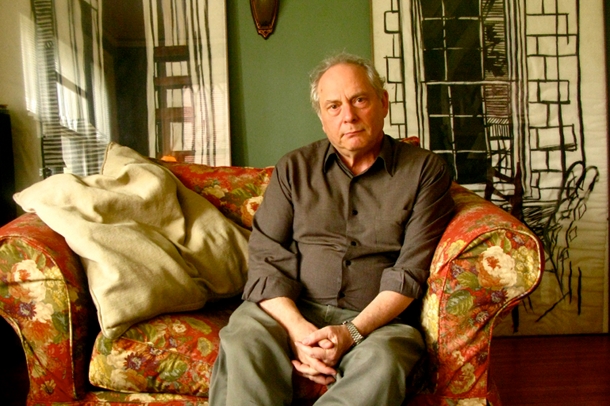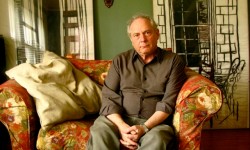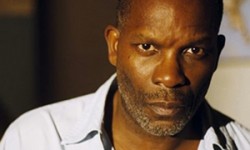
Made in Canada Interview: John Kastner - Canada’s Gutsy Documentarian

Editor’s Notes: John Kastner’s latest documentary, Not Criminally Responsible, comes to CBC for a world broadcast premiere on DOC ZONE October 17th at 9:00 PM ET.
John Kastner is an award winning Canadian documentarian and if you haven’t seen any of his films, this is a call saying that you should. After acting at a very young age, Kastner took on directing documentaries and went on to win four Emmys, and five Emmy nominations for his films Four Women, Fighting Back, Life With Murder, and The Lifer And The Lady.
I recently had a Kastner film marathon and it was a hard watch. With tissues on one side and a notebook in the other, I found myself crying and engaging in ideas that were once unapproachable to me. The subjects he takes on are hard hitting and are sensitive in nature. Take for example, Fighting Back, the tale of children struggling with leukemia, fighting for their lives with the heart-wrenching support of their parents. Then there’s Life With Murder, the story of a family who deals with the consequences of their daughter’s murder while supporting the son who killed her. In The Lifer And The Lady a man with a violent past, tries to reform, and get parole to be with the love of his life.
In his latest effort, Not Criminally Responsible, Kastner brings us the portrait of a non-violent young man who suddenly savagely attacks “the prettiest woman he could find.” He suffers from a mental disorder, and is found to not be criminally responsible for the crime, but is sentenced to time in a forensic psychiatric facility. Twelve years later, he’s been treated and doing amazingly well, and applies for a conditional discharge. His victim and everyone involved in the case must deal with the consequences and the fear that comes with such a possibility.

These films are real and stark in their ability to grab at the essence of human nature. Kastner has a way of making the image and the moving subject a relatable person as opposed to the monster we might perceive them as, or as in the case of Fighting Back, the people become more than just their tragic circumstances. I found myself disturbed and strangely comforted by the idea that none of us are alone when it comes to varied reactions to the schema life has us feel. The real world can be way more fascinating in its silence and in its moments of too much information. It’s when the killer says, “I just want a chance to be better,” and truly believe it that all the notions of us versus them go out the window. It’s a pill that is hard to swallow, but if reality television is the mode of entertainment now, the documentary should be its mentor. While the world watches people compete for a prize for a fake glory, documentarians are bringing us true to life stories where sometimes the trial is just for a new chance at life.
I had a chance to talk to John Kastner recently and I asked him a few things about his methods in documentary filmmaking.
Jacqueline: I know this is probably a common question that gets asked of you, but why on earth would you chose these dark subjects? In many ways, they feel like a kick in the gut sometimes, a much deserved one.
John Kastner: I tend to do films that fall into one or two groups: about crime and corrections and/or health issues. Finally I found a subject that combines both!
I had no knowledge about mental health really, experience with it, and never been to a shrink. It was a propsed to me by a forensic psychiatrist Dr. Lisa Ramshaw that I make Not Criminally Responsible. To my surprise and great joy, I just fell in love with this whole field.
Jacqueline: How do you create these moments with the people you document? How do you generate these palpable moments?
John Kastner: First of all, I tell anyone who works with me and talks with the patients that you have to go in there as a human being first and a journalist second. When people are this ill and fragile, you have to put their interests above the interests of the program. Sometimes it’s very hard to do because you can see some amazing things, but with film being an amazing medium, these things can’t be too good for the patient. Sometimes it’s too much and you have to take it out.
Now that’s the starting point. You have to make sure you know that you’re going to protect them and do something that is in their best interests; because they come to be suspicious. But if you really mean it and they feel that you are there for them, eventually most people will open up to you gradually. But it does take time. It takes financial support too because that time is expensive. To get up to Brockville continually did take that support. Luckily we had this magnificent support from the National Film Board, the CBC, and the Documentary Channel. Otherwise, it would not have been possible.
Jacqueline: Do you get attached to your subjects? I’m thinking here of your film Fighting Back. That must have been a demanding film…
John Kastner: Oh definitely, some more than others. I mean that film, aside from this project, that film, tore me up so much. It’s the only film I’ve made that I won’t look at again.
I just loved Michael and his family. Actually at one point the crew and I fled because we just couldn’t take it. It was horrible. We broke off and I came home from London. A friend of mine told me, “Are you crazy? Just finish it, keep going, and decide what you want to do with it later. But don’t give up.”
So we dragged ourselves back to finish it. I became close to Michael and his family and it tore me up. You have to have a heart of stone not to be affected by all that.
Jacqueline: In The Lifer And The Lady and in Not Criminally Responsible you give us unheard tales of redemption…
John Kastner: People often ask me why I focus on such dark subjects. Well, I start with dark subjects, but I end up filming triumphs of the human spirit. I look for somebody who is fighting; who’s trying to climb out of some dark pit of their lives. That, to me, is the most moving thing.
I do a lot of films on crime, but I don’t do something like mafia hit men. I’m interested in parole. They may have done something terrible, but they’re trying to hack their way out of that hole, and be a part of the world again.
It is hard to go into that world though, but there’s a reason for my explorations in these subjects. When I was nineteen, I read Dostoyevsky ‘s Crime and Punishment. Back then, there we didn’t see this much homeless on the streets. We used call them derelicts and if you saw them, you pretty much averted your eyes because it felt embarrassing. Now homelessness is rampant and you acknowledge it and you have to face it. There’s a scene in Crime and Punishment where the main character Rodion Raskolnikov witnesses a derelict being partially run over by a carriage. The man was all filthy and disgusting; most people would have looked away and ignored him. Raskolnikov crosses the street, picks the guy up, and carries him home. Dostoyevsky is a genius with character and tells the story of this man who was once an excellent civil servant with a daughter he was so proud of. I don’t remember how they came to grief, but the daughter had to become a prostitute. I mean, if I was nineteen and had seen that, I would have walked on past, but what a thing: to tell society to look and care. I want to introduce you to these people so you can care about them. That influenced me so very much. In a way, I’ve been trying to do that with my documentaries.
I was an actor and I played murderers, for example. You have to do the emotional research. What if I was like this? You don’t think about how unpleasant it will be to relate to a murderer in a play, you just do it. If I hadn’t had that story, I couldn’t make these films.
There’s a great quote : “Nothing human is alien to me.” (Terentius) and it’s a wonderful sentiment because it could happen to anyone. You place yourself in those shoes because it’s entirely possible one day you might find yourself in them.
Jacqueline: With Not Criminally Responsible, it must have been quite a thing to see Julie Bouvier overcome her trauma, and then going public with her parents to forgive Sean Clifton (who attacked, disfigured, and almost killed Julie), at the premiere in April…
John Kastner: They are almost saintly. It’s hard to believe that in this dark world there are people that can forgive. I love the Bouviers and it was an incredible moment.
What can Canada do to support its documentaries and documentarians?
There was a time when documentaries were considered cod liver oil: unpleasant medicine. The drama and comedy of real life is so delicious and so compelling. If you attended any of the screenings of documentary film, people sitting there are so riveted and caught up. I think the difficulty is the short attention span in art nowadays. There’s this wonderful program at Hot Docs where they go to schools and show them real documentaries. Stuff like that gets everyone interested from the get go. To envelope the great chaos in a real life story and bring it to the young people. I think that’s a great thing.
Documentaries are considered the national art form of Canada. We’re pioneers in it. The cinéma vérité, our National Film Board, and the techniques we use, they’re all influential for all film genres around the world.
When you open up the paper to see the film listings, consider a documentary. There are a lot of great storytellers out there and as Canadian documentary filmmakers we are telling our national stories. These are our stories, our heroes, and we should watch and listen.
Related Posts
Jacqueline Valencia
Latest posts by Jacqueline Valencia (see all)
- TIFF’s Objects of Desire - The Cinema of Claire Denis Review: Chocolat (1988) - NP Approved - October 16, 2013
- Made in Canada Interview: John Kastner - Canada’s Gutsy Documentarian - October 14, 2013
- Review: Machete Kills (2013) - October 9, 2013

























